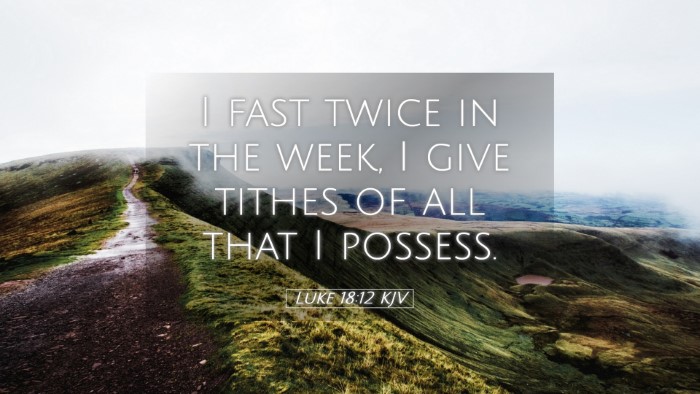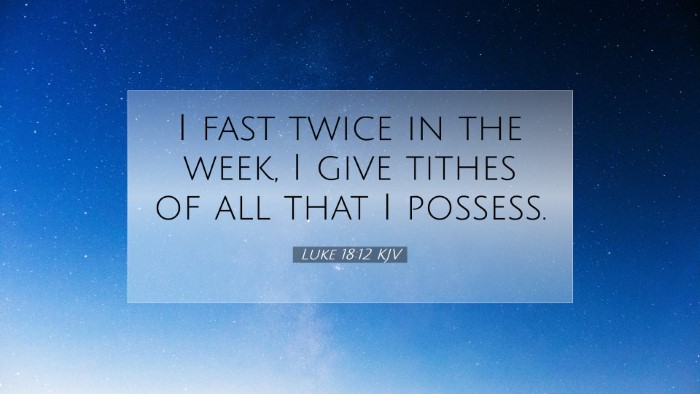Commentary on Luke 18:12
Verse: Luke 18:12 - "I fast twice in the week, I give tithes of all that I possess."
Introduction
In this verse, we encounter the self-righteous declaration of the Pharisee who stands before God, priding himself on his religious observances. It is crucial to understand the context of this assertion, which is found in the Parable of the Pharisee and the Tax Collector. This parable illustrates the contrasting attitudes of two men regarding their relationship with God and righteousness.
Contextual Understanding
The setting of this parable is significant for interpreting the Pharisee’s claims. Jesus tells this parable to some who were confident in their own righteousness and looked down on others (Luke 18:9). The contrast between the actions of the Pharisee and the Tax Collector serves to highlight key theological points about humility, grace, and justification before God.
Analysis of the Pharisee’s Claim
- Fasting: The Pharisee claims to fast twice a week. This was more than the Jewish law required, which only mandated fasting on the Day of Atonement. His practice reflects an attitude of legalism and a desire to portray himself as more righteous than others.
- Tithing: By stating, "I give tithes of all that I possess," the Pharisee emphasizes his meticulous adherence to the law regarding tithes. He goes beyond the required practices, indicating a self-congratulatory spirit.
Matthew Henry notes that "the Pharisee did indeed perform these duties, but his heart was far from God." It is essential to understand that while external compliance to the law is commendable, it is the internal attitude before God that determines true righteousness.
The Attitude of the Pharisee
The Pharisee’s self-referential prayer reveals his arrogance and pride. According to Albert Barnes, “self-righteousness is confident, and looks with contempt on others.” His approach emphasizes the notion that he believes his works somehow merit God’s favor, which stands in stark contrast to the humility exhibited by the Tax Collector who beat his chest and pleaded for mercy.
Theological Implications
The contrast presented in this passage provides significant theological insights into the nature of salvation and justification:
- Grace vs. Works: The Pharisee’s reliance on his works illustrates the danger of attempting to achieve righteousness through human effort. Clarke comments that “salvation is wholly of grace, and man’s works can add nothing to it.”
- Humility Before God: The parable emphasizes that those who exalt themselves will be humbled. The Tax Collector, recognizing his sinfulness and need for mercy, ultimately finds acceptance before God, as noted by Henry, who states, “We must come as we are, sinners pleading for mercy.”
Lessons for Believers
This passage serves as a warning against self-righteousness and promotes a deep understanding of genuine repentance:
- Self-examination: Believers are encouraged to examine their own hearts and motivations. Are we serving God and our communities out of a true desire for relationship, or are we caught in a cycle of performance?
- The Importance of Mercy: Just as the Tax Collector sought mercy, followers of Christ should extend grace to others, reflecting God’s heart for restoration rather than judgment.
Conclusion
Luke 18:12 illustrates the tension between legalistic practices and true heart transformation. The Pharisee's declaration, while grounded in genuine actions, reflects a heart devoid of humility and loyalty to God. In contrast, the Tax Collector's attitude of repentance opens the door to true righteousness rooted in faith and reliance on God's merciful character. As such, this passage calls all believers—pastors, students, theologians, and scholars—to a refreshing reminder that our value before God is not measured by our achievements, but by our dependence on His grace and mercy.


